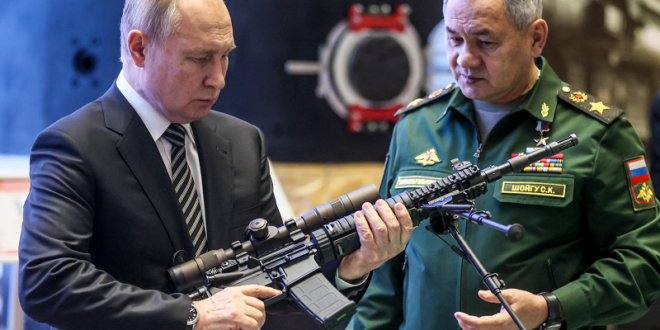The United States has marshaled support from its European allies for significant sanctions against Moscow should Russian President Vladimir Putin proceed with a new invasion of Ukraine.
But the strategy of relying heavily on the sanctions threat to shape Russian behavior faces challenges and limitations. Political divides on the issue persist among European allies, while dependence on Russian energy in Europe all but precludes targeting Russian oil and gas exports directly, which potentially would hurt Putin most. Disagreement remains about what threats, if any, are punishing enough to influence Putin’s thinking and how specific the West should be about the measures in advance.
At stake is the possibility of a renewed war in Europe.
Putin, who is due to give a year-end news conference on Thursday, warned this week that Moscow will take “military technical measures” if NATO continues its military drills and weapons deployments near Russia. His defense minister, Sergei Shoigu, accused U.S. military contractors of bringing chemicals to Ukraine’s eastern front to stage a provocation — an allegation the Pentagon dismissed as false. Cybersecurity researchers have noted concerning levels of targeting against Ukrainian cyber networks that would be of interest to Moscow.
President Biden hasn’t spelled out publicly exactly what punishments Russia would face in the event of a new invasion of Ukraine. U.S. officials have said measures would go far beyond those imposed in 2014, when Russia annexed Crimea from Ukraine and fueled a separatist war in the country’s east.
“There is broad consensus between Washington and key allies in Europe and elsewhere on the need for a high impact, quick action response,” said one U.S. official, who like others, spoke on the condition of anonymity because of the matter’s sensitivity.
The administration has emphasized the threat of economic sanctions is just one piece of the U.S. strategy to defuse the crisis, which also includes diplomatic talks with Russia and a pledge to send more U.S. forces and materiel to allies in Europe should Russia invade.
On sanctions, the administration is planning to first take aim at the Russian financial sector and has been engaging with companies and foreign governments to prepare them, according to current and former U.S. officials. It is also looking at sectors beyond finance and considering a range of export controls, the officials said.
Unlike in 2014, when the United States started by targeting individuals involved in the Crimea annexation and didn’t apply sectoral sanctions for months, the Biden administration likely would start with the broader economic sanctions that carry painful costs, and then follow through with the designations of individuals or military units for “naming and shaming” purposes, the officials said.
Full-scale sanctions on Russian financial firms would go much further than past measures, with state controlled-companies such as the Russia Direct Investment Fund, the development bank VEB and state-controlled VTB Capital or Gazprombank potentially in the crosshairs, according to Brian O’Toole, a former senior Treasury Department official, who worked on sanctions in the Obama administration.
Before facing sanctions in 2014, Bank Rossiya, the preferred bank of Putin’s inner circle, boasted relationships with the biggest capitals around the world, O’Toole noted.
“Literally overnight it became a Russia-only, ruble-only bank,” he said. “And it probably would have collapsed had the Russian government not bailed it out. Think of that but on a much bigger scale.”
A U.S. government official who specializes in Russian affairs said full-scale sanctions on major Russian state-owned enterprises would “really, really hurt” and are “not something the Russians should dismiss lightly.” Still, whether they will stop Putin is unclear.
“The decision [on whether to invade] is going to be made by a couple guys at the top and this is so important to them that I don’t think that even that is going to dissuade them,” the official said.
U.S. and European officials have discussed suspending Nord Stream 2, the new gas pipeline from Russia to Germany that has yet to start operations. Russia could also face sanctions on sovereign debt on the secondary market, sanctions on additional state-owned enterprises or oligarchs with links to Putin and the possibility of being cut off from the Society for Worldwide Interbank Financial Telecommunications (SWIFT) international payments system.
Banning Russia from SWIFT, which is based in Belgium, would have chaotic short-term effects on the Russian market that could spill over into other countries, analysts said, but over the long term, Russian authorities would find a way to adapt.
Because Europe is so reliant on Russian energy, full-scale sanctions on Russian state oil and gas giants Gazprom and Rosneft would cause far too much pain for Europeans to be considered palatable.
“Even if Russia invades Ukraine, all these European countries will still have to buy Russian gas,” said Emily Holland, a professor at the U.S. Naval War College who specializes in Russian energy politics.
It’s possible to target the Russian energy sector more surgically by extending export controls on advanced technology that Russia needs for oil and gas production or banning investment in onshore Arctic development, Holland said.
Europe’s energy vulnerability has become especially pronounced in recent months as prices have soared to record highs. The prices are such a problem that European leaders burned extensive time discussing them at a summit in Brussels last week, according to a senior European diplomat familiar with the talks, and some officials believe the Kremlin is using its leverage right now on energy to get its way in Ukraine.
Differing threat perceptions among European allies and worries about energy prices have led a group of countries led by Germany and including France, Spain and Italy to engage in talks with Moscow before nailing down or previewing specific sanctions, European diplomats said.
The leaders of Poland and Lithuania, meanwhile, visited Ukraine this week and said sanctions should be applied on Russia now. Eastern-flank allies also want Washington and Brussels to say specifically what measures Russia will face, rather than waiting to announce them after it’s too late to stop Putin.
Biden administration officials say Putin is well aware of the specific consequences, and note that it is beneficial to retain some ambiguity about specific targets.
“History is repeating itself from 2014, where the United States is more ready to forge a stronger package of sanctions, and the E.U. is riven by tensions that have not been resolved,” said Maria Shagina, a sanctions expert and visiting fellow at the Finnish Institute of International Affairs.
The risk, she said, is Moscow may come to believe the West won’t impose really harsh sanctions or do anything “bold and unexpected,” which is necessary as a deterrent.
Still, top European officials have said there is broad agreement to take severe and unprecedented economic measures against Russia in the event of a new invasion, even if the details haven’t been fully decided or announced.
The European Commission has drawn up a menu of different possibilities that the 27 E.U. nations could impose rapidly depending on whether Russia launches a full-scale invasion or something less overt, the senior European diplomat said, noting that nothing has been decided.
 Eurasia Press & News
Eurasia Press & News




